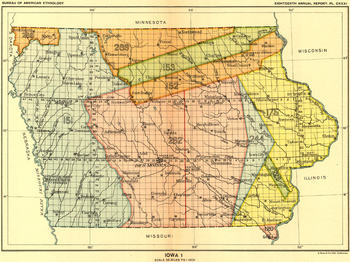

Encyclopedia Dubuque
"Encyclopedia Dubuque is the online authority for all things Dubuque, written by the people who know the city best.”
Marshall Cohen—researcher and producer, CNN
Affiliated with the Local History Network of the State Historical Society of Iowa, and the Iowa Museum Association.
KEOKUK'S RESERVE: Difference between revisions
New page: left|thumb|250px|The yellow section on this map shows the case of Keokuk's Reserve.KEOKUK'S RESERVE. The terms of the treaty ending the Black Hawk War resulted... |
No edit summary |
||
| (6 intermediate revisions by the same user not shown) | |||
| Line 1: | Line 1: | ||
[[Image:Keokuk Reserve. | [[Image:Keokuk Reserve.png|left|thumb|250px|The yellow section on this map shows the area of Keokuk's Reserve.]]KEOKUK'S RESERVE. The terms of the treaty ending the [[BLACK HAWK WAR]] resulted in the United States' gaining a large section of present-day Iowa known as the [[BLACK HAWK PURCHASE]]. Keokuk's Reserve was carved out of this cession. The treaty stated that the reserve include Keokuk's Village, about twelve miles (19 km) from the [[MISSISSIPPI RIVER]], as well as equal portions of land on either side of the Iowa River. | ||
On September 28, 1836 a new treaty was signed which ceded all of the land within Keokuk's Reserve to the United States government. The treaty text stated that the reasoning behind the | On September 28, 1836 a new treaty was signed which ceded all of the land within Keokuk's Reserve to the United States government. The treaty text stated that the reasoning behind the [[SAUK AND FOX]] decision to cede the land was to "(obtain) additional means of support, and to pay their just creditors". | ||
The Sauk and Fox living within Keokuk's Reserve were removed to another reservation along the Des Moines River. In addition, the treaty stipulated payment to Sauk and Fox of $30,000 in June 1837 and $10,000 per year for ten succeeding years. The treaty also made other stipulations including a $1,000 payment to the widow of Felix St. Vrain and about $48,000 for the Sauk and Fox to settle their debts. | The Sauk and Fox living within Keokuk's Reserve were removed to another reservation along the Des Moines River. In addition, the treaty stipulated payment to the Sauk and Fox of $30,000 in June 1837 and $10,000 per year for ten succeeding years. The treaty also made other stipulations including a $1,000 payment to the widow of Felix St. Vrain and about $48,000 for the Sauk and Fox to settle their debts. | ||
--- | --- | ||
Source: | Source: | ||
| Line 12: | Line 14: | ||
[[Category: Legal Jurisdiction]] | [[Category: Legal Jurisdiction]] | ||
[[Category: Map]] | |||
Latest revision as of 19:08, 1 October 2024

KEOKUK'S RESERVE. The terms of the treaty ending the BLACK HAWK WAR resulted in the United States' gaining a large section of present-day Iowa known as the BLACK HAWK PURCHASE. Keokuk's Reserve was carved out of this cession. The treaty stated that the reserve include Keokuk's Village, about twelve miles (19 km) from the MISSISSIPPI RIVER, as well as equal portions of land on either side of the Iowa River.
On September 28, 1836 a new treaty was signed which ceded all of the land within Keokuk's Reserve to the United States government. The treaty text stated that the reasoning behind the SAUK AND FOX decision to cede the land was to "(obtain) additional means of support, and to pay their just creditors".
The Sauk and Fox living within Keokuk's Reserve were removed to another reservation along the Des Moines River. In addition, the treaty stipulated payment to the Sauk and Fox of $30,000 in June 1837 and $10,000 per year for ten succeeding years. The treaty also made other stipulations including a $1,000 payment to the widow of Felix St. Vrain and about $48,000 for the Sauk and Fox to settle their debts.
---
Source:
The WPA Guide to 1940s Iowa.